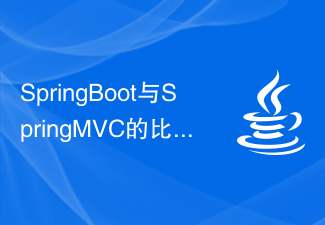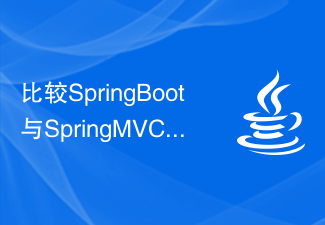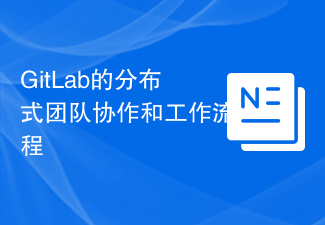
SpringMVC workflow
1. Introduction to SpringMVC
SpringMVC is a Spring-based implementation It is a request-driven lightweight Web framework that adopts the Web MVC design pattern. It uses the idea of the MVC architectural pattern to decouple the responsibilities of the web layer and manage the life cycle of the objects required by the application. It provides a lot of tools to simplify daily development. Great convenience.
SpringMVC provides the main switch DispatcherServlet; request processing mapper (Handler Mapping) and processing adapter (Handler Adapter), view resolver (View Resolver) for view management; action processor Controller interface (including ModelAndView, and Processes request and response objects (request and response), has flexible configuration, supports file upload, simple data conversion and other powerful functions.
(Related video tutorial sharing: java video tutorial)
2. Workflow and introduction

(1) The client sends a request through the url
(2-3) The core controller Dispatcher Servlet receives the request, finds the corresponding handler through the system or custom mapper configuration, and sends The controller mapped by the url is returned to the core controller.
(4) Find the system or default adapter through the core controller
(5-7) From the found adapter, call the processor that implements the corresponding interface, and return the result to the adapter, The result contains data model and view objects, which are then returned to the core controller by the adapter
(8-9) The core controller passes the object combining the obtained data and the view to the view parser, and obtains the parsed The result is responded to by the view parser to the core controller
(10) The core controller returns the result to the client
3. Adapter role
The mapper involved in SpringMVC, the role of the view parser is not difficult to understand. The mapper is responsible for mapping the url of the front-end request to the configured processor. The view parser parses the final result, but why does it need to go through a layer of adapters in the middle? Well, why not directly execute and return after finding the controller through the mapper?
That’s because SpringMVC provides a variety of interface implementations for business processors (such as implementing the Controller interface), and the adapter is used to ultimately select a different type from the registered one based on what interface the processor implements. The Handler Adapter is matched and finally executed. For example, SimpleControllerHandlerAdapter supports controllers that implement the controller interface. If the controller you write implements the controller interface, then SimpleControllerHandlerAdapter will execute the specific methods in the controller you wrote. Complete the request.
For more SpringMVC related tutorials, please pay attention to the Java Tutorial column.
The above is the detailed content of SpringMVC workflow. For more information, please follow other related articles on the PHP Chinese website!
 SpringBoot与SpringMVC的比较及差别分析Dec 29, 2023 am 11:02 AM
SpringBoot与SpringMVC的比较及差别分析Dec 29, 2023 am 11:02 AMSpringBoot和SpringMVC都是Java开发中常用的框架,但它们之间有一些明显的差异。本文将探究这两个框架的特点和用途,并对它们的差异进行比较。首先,我们来了解一下SpringBoot。SpringBoot是由Pivotal团队开发的,它旨在简化基于Spring框架的应用程序的创建和部署。它提供了一种快速、轻量级的方式来构建独立的、可执行
 比较SpringBoot与SpringMVC的差异是什么?Dec 29, 2023 am 10:46 AM
比较SpringBoot与SpringMVC的差异是什么?Dec 29, 2023 am 10:46 AMSpringBoot与SpringMVC的不同之处在哪里?SpringBoot和SpringMVC是两个非常流行的Java开发框架,用于构建Web应用程序。尽管它们经常分别被使用,但它们之间的不同之处也是很明显的。首先,SpringBoot可以被看作是一个Spring框架的扩展或者增强版。它旨在简化Spring应用程序的初始化和配置过程,以帮助开发人
 GitLab的分布式团队协作和工作流程Oct 27, 2023 am 08:56 AM
GitLab的分布式团队协作和工作流程Oct 27, 2023 am 08:56 AMGitLab的分布式团队协作和工作流程,需要具体代码示例随着软件开发行业的快速发展,分布式团队协作和工作流程成为了一个重要的话题。GitLab作为一个强大的代码托管平台,提供了丰富的功能和工具,可以支持分布式团队的协作和工作流程。一、GitLab简介GitLab是一个基于git的代码托管平台,它提供了丰富的功能和工具,如代码仓库管理、问题追踪、持续集成、持续
 PHP CRM系统中如何开发自动化工作流程功能Sep 11, 2023 pm 06:06 PM
PHP CRM系统中如何开发自动化工作流程功能Sep 11, 2023 pm 06:06 PM随着信息化的发展,企业越来越重视客户关系管理(CRM)系统的建设和应用。在PHP开发的CRM系统中,自动化工作流程功能被广泛采用,可以大大提高工作效率,优化业务流程。本文将介绍如何开发自动化工作流程功能。一、需求分析在开发自动化工作流程功能之前,首先需要进行需求分析,理解用户的具体需求和业务流程。例如,用户希望在特定时间段内自动发送邮件、短信或通知,或者根据
 如何利用PHP扩展SuiteCRM的工作流程Jul 17, 2023 pm 06:06 PM
如何利用PHP扩展SuiteCRM的工作流程Jul 17, 2023 pm 06:06 PM如何利用PHP扩展SuiteCRM的工作流程SuiteCRM是一款功能强大的开源CRM系统,它提供了丰富的功能和灵活的架构,使用户能够自定义和扩展系统的行为。在这篇文章中,我们将讨论如何利用PHP扩展SuiteCRM的工作流程。工作流程是SuiteCRM中一个非常重要的功能,它可以帮助用户自动化业务过程,提高效率和准确性。SuiteCRM提供了一些默认的工作
 如何选择合适的numpy版本,优化数据科学工作流程Jan 19, 2024 am 09:23 AM
如何选择合适的numpy版本,优化数据科学工作流程Jan 19, 2024 am 09:23 AMnumpy是Python中常用的数学运算库,它提供了强大的数组操作和数值计算功能。然而,随着numpy版本的不断更新,用户如何选择合适的版本,成为了一个重要的问题。选择合适的numpy版本可以优化数据科学的工作流程,提高代码的可维护性和可读性。本文将介绍如何选择numpy版本,并提供实际的代码示例,供读者参考。1.了解numpy不同版本的特点numpy库更
 SpringBoot与SpringMVC的区别是什么?Dec 29, 2023 pm 05:19 PM
SpringBoot与SpringMVC的区别是什么?Dec 29, 2023 pm 05:19 PMSpringBoot和SpringMVC是Java开发中常用的两个框架,它们都是由Spring框架所提供的,但在功能和使用方式上有着一些区别。本文将分别介绍SpringBoot和SpringMVC的特点和区别。一、SpringBoot的特点:简化配置:SpringBoot通过约定优于配置的原则,大大简化了项目的配置过程。它可以自动配置项目所需要的参数,开发人
 Java的SpringMVC拦截器怎么用May 13, 2023 pm 02:55 PM
Java的SpringMVC拦截器怎么用May 13, 2023 pm 02:55 PM拦截器(interceptor)的作用SpringMVC的拦截器类似于Servlet开发中的过滤器Filter,用于对处理器进行预处理和后处理。将拦截器按一定的顺序联结成一条链,这条链称为拦截器链(InterceptorChain)。在访问被拦截的方法或字段时,拦截器链中的拦截器就会按其之前定义的顺序被调用。拦截器也是AOP思想的具体实现。拦截器和过滤器区别区别过滤器(Filter)拦截器(Intercepter)使用范围是servlet规范中的一部分,任何JavaWeb工程都可以使用是Spri


Hot AI Tools

Undresser.AI Undress
AI-powered app for creating realistic nude photos

AI Clothes Remover
Online AI tool for removing clothes from photos.

Undress AI Tool
Undress images for free

Clothoff.io
AI clothes remover

AI Hentai Generator
Generate AI Hentai for free.

Hot Article

Hot Tools

SAP NetWeaver Server Adapter for Eclipse
Integrate Eclipse with SAP NetWeaver application server.

EditPlus Chinese cracked version
Small size, syntax highlighting, does not support code prompt function

Dreamweaver Mac version
Visual web development tools

Notepad++7.3.1
Easy-to-use and free code editor

VSCode Windows 64-bit Download
A free and powerful IDE editor launched by Microsoft






